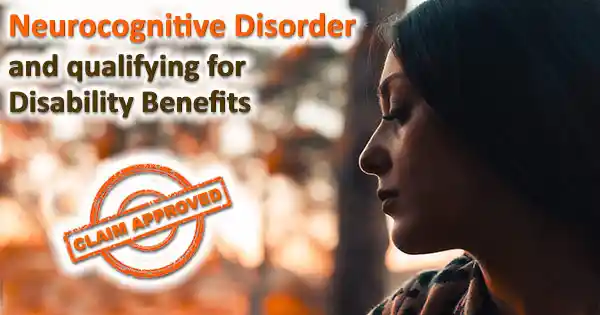Neurocognitive Disorder and obtaining Social Security disability benefits
Author: Attorney Lloyd Bemis
Updated: 7/15/2024
Can I get disability benefits if I am suffering from the effects of a neurocognitive disorder?
To qualify for Disability Insurance (SSDI) under the Blue Book listing, you must show limitations in areas such as learning and memory, attention, planning and social behavior. If you do not meet these requirements, the SSA will consider your mental limitations in combination with your age, education, work experience, and skills to determine if you have the ability to perform your previous job or any other job. If Social Security cannot find a job that you can do given your impairments, you may still be approved for disability benefits through a medical-vocational allowance.
Can I get Disability Benefits for a Neurocognitive Disorder?
Approximately five million people in the U.S. are living with some degree of neurocognitive disorder. Neurocognitive disorder, also called cognitive disorder, is a group of conditions that significantly weaken a person’s mental functions; among those conditions are Alzheimer’s, Huntington’s disease, Parkinson’s disease, prion disease, traumatic brain injury and dementia/neurocognitive issues due to HIV infection.
If you are suffering from the effects of neurocognitive disorder you may qualify for disability benefits.
These conditions affect an individual’s memory, attention span, perception, and learning ability.
People with neurocognitive disorder may also experience difficulty understanding language and have trouble in social situations and performing daily routine tasks. Neurocognitive disorder can be either major or minor in nature and though more commonly seen in older adults, a neurocognitive disorder can affect people of all ages and health backgrounds.
Because many different things can cause neurological disorder and the condition affects different parts of the brain, symptoms vary from person to person and appear suddenly or over time.
The most common symptoms include:
- Difficulty remembering and focusing
- Headaches
- Confusion
- Difficulty planning and making decisions
- Changes in an individual’s behavior
- Increased anxiety and agitation
- Vision problems
- Difficulty performing daily tasks such as managing money and driving
- Trouble with balance and walking
- Difficulty with fine motor skills like buttoning a shirt or using utensils
These or a combination of these symptoms can cause you to miss work and jeopardize your ability to maintain employment.
How can I get approved for SSDI if I have a cognitive disorder?
Social Security recognizes neurocognitive disorders in its Blue Book under Section 12.02. Under this listing, Social Security evaluates disorders “characterized by a clinically significant decline in cognitive functioning.”
To qualify for SSDI under this listing, you must be able to show limitations in one or more of the following:
- Learning and memory
- Paying attention, listening to others
- Inability to plan
- Decreased judgment
- Problems with walking, balance, or coordination
- Problems speaking, recalling words, or misuse of words
- Inability to determine appropriate behavior in social situations
You must also exhibit an extreme limitation of one, or marked limitation of two of the following:
- Understanding, remembering, or applying information
- Concentrating and maintaining pace when working on tasks
- Interacting with others
- Managing oneself in a work environment; i.e., understanding appropriate attire and behavior and being aware of safety hazards.
The Social Security Administration realizes that some individuals will not meet the above requirements because they live in a supportive and supervised situation such as an institution, a group home, or at home where their functional abilities appear better than they would be in real-life situations where the stress and demands on them would be greater.
In these situations, your neurocognitive disorder must be medically documented as serious and persistent over a period of at least two years and you must be receiving medical treatment, mental health therapy, and psychosocial support, or be living in a highly structured setting that diminishes the symptoms and signs of the mental disorder. You must have minimal capacity to adapt to changes in your environment or to handle demands that are not part of your daily life.
To evaluate your case, Social Security wants to see all relevant medical evidence you can provide about your disorder from your doctors and other medical providers, including:
- Your symptoms and diagnosis
- Your medical, psychiatric, and psychological history
- Results of physical and mental status examinations
- Imaging results and other laboratory reports
- Medications you take, your response and side effects
- Type, frequency, and effects of therapy you receive
- Observations of how you function during exams and therapy
- Information about your cultural background that may affect an evaluation of your disorder
- Prognosis of your symptoms
Social Security may also seek information about your disorder and daily functioning from your family, friends and other people who know you and consider whether your statements and those from third parties are consistent with medical evidence provided.
Social Security is more concerned with your ability to function in a work-related setting than what type of neurocognitive disorder you have.
If your symptoms are not severe enough to satisfy the Blue Book listing, Social Security will consider your mental limitations in combination with your age, education, work experience and skills to determine if you have the ability to perform your previous job or any other job. Doctors working for Social Security will evaluate your mental impairments and complete a mental residual functional capacity form (RFC). Vocational analysts will then review the non-medical parts of your application together with the mental RFC. If Social Security cannot find a job that you can do given your impairments, you may still be approved for disability benefits even though your neurocognitive disorder does not satisfy the listing. This is called a medical-vocational allowance.
“Once Social Security determines the limitations caused by your condition, they will employ a vocational expert to assess whether a person with these limitations is employable. Most vocational experts will find a person to be unemployable if their condition or the treatment rendered for the condition causes the person to regularly be absent two or more days a month or be “off-task” 15% or more of the workday.”
A Dickinson client of ours was denied Short Term Disability by Cigna.
She underwent a neuropsychological evaluation which found cognitive impairments. At the suggestion of the neuropsychologist, she then underwent a Functional Capacity Evaluation which found physical limitations. Both of the tests, which are considered the “gold standard” for making disability determinations, found our client incapable of full-time employment. Her doctor described her limitations so as to include two hours of rest with every one hour of activity. These restrictions were indefinite. Although she could perform some functions, she was limited to part-time work and could not earn 80% of her indexed pre-disability earnings unless she could work at least 80% of a full-time schedule. There was no evidence in the record that she could do so.
We fought Cigna when it denied her claim and were granted a settlement.
Your Free Initial Consultation
Call now:
At Bemis, Roach and Reed, if we can't help you, we will try to find the right attorneys for you.
We offer each of our prospective clients a free no obligation one hour phone or office consultation to see if we can help you and if you are comfortable with us. We know how difficult a time like this can be and how hard the decisions are. If we can be of assistance to you and help you find a solution to your issue we will even if that means referring you to another attorney.
Let's get you Started:
If you could provide us with some basic information about your claim we will get right back with you with a free case evaluation and schedule your Free Consultation Today.
You can also email us at: contact@brrlaw.com
Disability Benefits FAQs
Social Security has some basic financial requirements.
Before you are eligible for Social Security disability benefits, you must satisfy some basic financial requirements. You must: 1) have a disability that has lasted or is expected to last 12 months; and 2) you must have worked in a job where you paid Social Security taxes long enough and recently enough; and 3) you must not earn more than Substantial Gainful Activity (SGA), which is $1,550 per month in 2024 for nonblind applicants and $2,590 per month for blind applicants.
Basic SSDI Requirements –>
You may also be eligible for Social Security Disability benefits if you have another medical condition.
One disorder alone may not meet the criteria of an impairment as stated in Social Security’s Blue Book, but if you have more than one medical condition, Social Security must consider how those health issues combined limit your ability to hold a job and perform necessary daily tasks.
Disability for Multiple Impairments –>
If you are 55 or older or have another medical condition you may get approval.
Applicants who are 55 or older often fall under a grid rule, which means they are not expected to learn a new job.
Disability for those over 55 –>
You may also be eligible for Social Security Disability benefits if you have another medical condition.
One disorder alone may not meet the criteria of an impairment as stated in Social Security’s Blue Book, but if you have more than one medical condition, Social Security must consider how those health issues combined limit your ability to hold a job and perform necessary daily tasks.
Disability for Multiple Impairments –>
Should you file a claim?
If you believe that you meet Social Security’s medical and financial requirements, you should apply for benefits. If you are still unsure or would like to talk to someone, please contact us at 512-454-4000. We are always ready to take your call and discuss your options with you free of charge. We are happy to help folks just like you find the best solution for their personal situation.
How do I file for Social Security Disability benefits?
Once you have decided to file a claim, you can take the first step and apply for Social Security Disability benefits in person at your local Social Security Administration office, online, or over the phone.
How to Apply for SSDI –>
Appealing denied benefits
Most who file are denied initially. That doesn’t mean you won’t qualify; you just need to file an appeal.
There are four steps to the Social Security appeal process.
SSDI Appeals Process –>
Do I need a disability attorney for SSDI?
You may certainly file a claim on your own, but evidence shows that your chances for approval are increased significantly if you have legal representation.
Do I need an SSDI attorney–>
What if I don’t qualify for SSDI?
If you haven’t worked long enough to earn enough work credits, or if you earn too much income, you may be eligible for disability benefits through another Social Security program, such as Supplemental Security Income (SSI), or from a long-term disability insurance plan through your employer or a privately purchased policy.
What is Supplemental Security Income or SSI?–>
I have long-term disability insurance – should I file a claim?
Absolutely – you should file a claim as soon as you become disabled.
LTD Disability Appeals Process–>
Disability benefits are an important source of income for those who are unable to work. If you are not able to work due to accident or illness, you may be eligible for Social Security Disability or Long Term Disability benefits. If you have applied for benefits and been denied, contact the attorneys at Bemis, Roach and Reed for a free consultation. Call 512-454-4000 and get help NOW.








